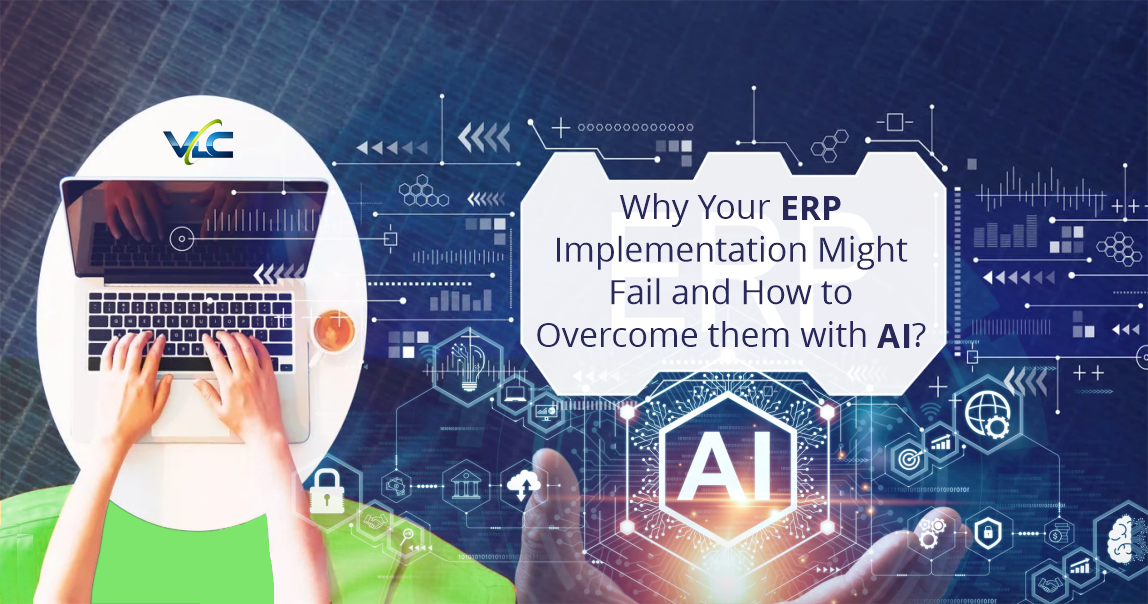Why Your ERP Implementation Might Fail and How to Overcome Them with AI?
Enterprise resource planning, or ERP, systems are becoming essential for businesses looking to boost output, gain a competitive edge, and simplify operations. Even yet, a lot of ERP implementations fall short of expectations. A Gartner research study claims that up to 75% of ERP projects fall short of their goals. Any firm preparing to implement ERP must comprehend the reasons behind these shortcomings. In this blog, we look at the main reasons for ERP implementation failure as well as risk mitigation strategies.
Lack of Clear Objectives and Requirements
One of the most common reasons for ERP implementation failure is the lack of clearly defined objectives and requirements. AI can aid in this process by leveraging data analytics to understand organizational needs better. Machine learning algorithms can analyze historical data to predict future needs and set realistic goals. Additionally, AI-driven tools can help define key performance indicators (KPIs) by identifying critical success factors and providing insights into potential challenges, ensuring that the ERP system aligns with the organization’s strategic vision.
Inadequate Project Management
ERP implementations are complex projects that require robust project management. AI-driven project management tools can optimize planning, resource allocation, and timeline adherence. Predictive analytics can foresee potential delays and budget overruns, allowing project managers to take proactive measures. AI can also facilitate regular communication among stakeholders by automating updates and generating real-time reports. A well-structured project management framework enhanced by AI significantly boosts the chances of a successful ERP implementation.
Insufficient Change Management
Change management is a critical yet often overlooked aspect of ERP implementations. AI can address employee resistance by providing personalized training programs and simulating real-world scenarios. Natural Language Processing (NLP) can enable more effective communication about the benefits of the new system, while AI-driven sentiment analysis can gauge employee acceptance and identify areas of concern. Involving AI in the change management process ensures a smoother transition and higher user acceptance.
Data Migration Challenges
Data migration is a complex and critical phase of ERP implementation. AI can mitigate migration challenges by using intelligent algorithms to clean and standardize data before migration, ensuring accuracy and integrity. Automated AI tools can detect and correct data anomalies, reducing the risk of data loss or corruption. Performing multiple test migrations with AI can help identify and resolve potential issues early on, ensuring a seamless data transition.
Phased Customizations and Over-Engineering
While ERP systems are designed to be adaptable, customizations if not planned in phases can lead to implementation failures. AI can help strike a balance by analyzing industry best practices and suggesting optimal customization levels. Machine learning models can identify which customizations are necessary and which can be phased or avoided, reducing complexity and costs. This approach not only ensures smoother upgrades and better system performance but also aligns the ERP system with the organization’s evolving needs. Remember, This is a continuous journey and not a one-time project.
Underestimating Time and Budget
Underestimating time and budget is a common pitfall in ERP implementations. Many projects fail because organizations overlook the necessary time and financial resources. AI can offer more precise estimations by analyzing similar projects and uncovering hidden costs. Predictive analytics can anticipate potential challenges and propose realistic timelines and budgets, covering aspects like training, data migration, and post-implementation support. AI-driven tools can monitor project progress, enabling timely adjustments to keep the implementation on track.
Lack of Vendor Support and Expertise
Choosing the right ERP vendor is critical to the success of the implementation. AI can enhance the vendor evaluation process by analyzing vendor expertise, support services, and track records using historical data and predictive models. AI tools can assess the compatibility of potential vendors with the organization’s needs, ensuring a solid partnership. Establishing a relationship with an AI-enhanced vendor provides access to the necessary resources, knowledge, and support throughout the implementation process.
Leading Your ERP Implementation to Success with VLC Solutions
Understanding the pitfalls that can derail an ERP implementation is the first step toward success. However, knowing how to navigate these challenges and leverage expert support can make all the difference. This is where VLC Solutions comes in.
At VLC Solutions, we specialize in delivering comprehensive ERP services that are tailored to meet your organization’s unique needs. Our approach is centered on understanding the common challenges associated with ERP implementations and a commitment to guiding our clients through each process phase.
Our ERP Services Include:
- Strategic Planning and Consulting: We work with you to define clear objectives, assess your requirements, and develop a strategic plan that aligns with your business goals.
- Project Management: Our experienced project managers ensure meticulous planning, resource allocation, and adherence to timelines, minimizing the risk of delays and budget overruns.
- Change Management: We provide robust change management strategies, including comprehensive training programs and continuous support to ensure high user adoption and smooth transitions.
- Data Migration: Our data migration experts utilize automated tools and best practices to ensure accurate, secure, and seamless data transfer from your legacy systems to the new ERP platform.
- Customization and Integration: We offer balanced customization services, ensuring that your ERP system is tailored to your needs without compromising on simplicity and maintainability.
- Post-Implementation Support: Our commitment doesn’t end with implementation. We provide ongoing support, system optimization, and regular updates to ensure your ERP system continues to deliver value.
Choosing VLC Solutions means partnering with a team dedicated to your success. Our proven methodologies, industry expertise, and commitment to the best services ensure that your ERP implementation is not just another project but a strategic initiative that drives growth and efficiency.
